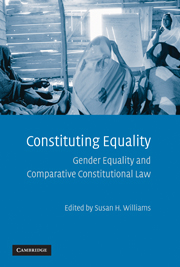Book contents
- Frontmatter
- Contents
- List of Contributors
- Acknowledgments
- CONSTITUTING EQUALITY
- Introduction: Comparative Constitutional Law, Gender Equality, and Constitutional Design
- SECTION ONE STRUCTURE
- SECTION TWO RIGHTS
- SECTION THREE CULTURE/RELIGION AND GENDER EQUALITY
- SECTION FOUR CONSTITUTIONS AND INTERNATIONAL LAW
- SECTION FIVE WOMEN IN THE PROCESS OF CONSTITUTION MAKING
- 12 Women in the Constitutional Drafting Process in Burma
- 13 Founding Mothers for a Palestinian Constitution?
- Conclusion: Gender Equality and the Idea of a Constitution: Entrenchment, Jurisdiction, and Interpretation
- Index
- References
13 - Founding Mothers for a Palestinian Constitution?
Published online by Cambridge University Press: 26 October 2009
- Frontmatter
- Contents
- List of Contributors
- Acknowledgments
- CONSTITUTING EQUALITY
- Introduction: Comparative Constitutional Law, Gender Equality, and Constitutional Design
- SECTION ONE STRUCTURE
- SECTION TWO RIGHTS
- SECTION THREE CULTURE/RELIGION AND GENDER EQUALITY
- SECTION FOUR CONSTITUTIONS AND INTERNATIONAL LAW
- SECTION FIVE WOMEN IN THE PROCESS OF CONSTITUTION MAKING
- 12 Women in the Constitutional Drafting Process in Burma
- 13 Founding Mothers for a Palestinian Constitution?
- Conclusion: Gender Equality and the Idea of a Constitution: Entrenchment, Jurisdiction, and Interpretation
- Index
- References
Summary
INTRODUCTION
As this chapter went to print, the Gaza Strip and West Bank Palestinian Territories were under the authority of two different Palestinian governments. Gaza was under the control of the Islamist group, Harakat al-Muqawama al-Islamiya (Hamas or the Islamic Resistance Movement), which unexpectedly won the majority of seats for the Palestinian Legislative Council (PLC) in January 2006. The West Bank was under the control of the Palestinian Authority (PA) under the leadership of President Mahmoud Abbas, head of the mainstream Fatah party. President Abbas appointed an alternative cabinet and received support from the international community in 2007, after brutal internecine fighting between the two parties led to a Hamas takeover of Gaza in June. Palestinian political conflict and ongoing problems in the peace process with Israel have prevented any focus by either Hamas or Fatah on the internal legal regime. At some point, the situation may improve and the dream of an independent state of Palestine may become an imminent reality. If so, Palestinians may return to a constitutive process that has been at a standstill for many years. Hopefully, women will be demarginalized and play a greater role than they did in the past. This chapter provides some potential guidance for those unknown founding mothers of the new Palestinian state, assuming that some of them, regardless of their political affiliation, will have a special interest in the plight of women.
- Type
- Chapter
- Information
- Constituting EqualityGender Equality and Comparative Constitutional Law, pp. 290 - 311Publisher: Cambridge University PressPrint publication year: 2009

